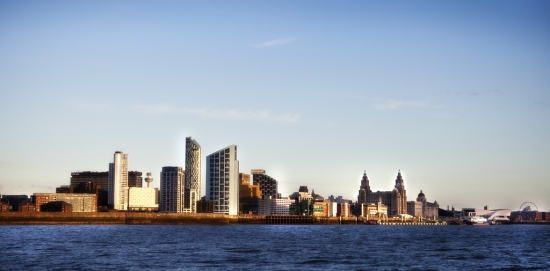After winning the prestigious European Capital of Culture award in 2008, Liverpool has been on an upward spiral of success. As well as extensive regeneration projects in much of the city, particularly focusing on the dockyard areas, the creation of shopping giant Liverpool One has made the Merseyside city a mecca for shoppers and tourists in the UK.

This week, the Government allowed this momentum to continue by approving final plans that will further the modernisation of Liverpool. A £5.5 billion redevelopment project, known as Liverpool Waters, will take place in the derelict docklands area of the city, with all stages of operations masterminded and overseen by Peel Developments.
While the exact plans have not yet been made public, the mixed use development is expected to boast several skyscrapers by the time the construction phase ends. There will also be thousands of square feet of both affordable and luxury residential space, offices and a cruise liner terminal to allow those in the local area to take advantage of the city’s riverside location.
What’s more, Peel Developments claim that the development will create up to 20,000 jobs for residents of Liverpool and the surrounding area. In turn, this is expected to hugely benefit the economy in the North West.
Joe Anderson, Mayor of Liverpool, voiced his excitement about the upcoming project.
He said; “This is fantastic news for Liverpool. Today’s announcement marks the start of a new era for Liverpool, paving the way to us delivering a world class development which will transform a part of the city that has been in desperate need of investment for decades.”
However, this good news could be slightly soured by a warning from UNESCO. The heritage organisation claims the development may “irreversibly damage” original architecture within the docklands and, as such, placed the city on an “in danger” list when plans were first submitted back in June.
Should the development change aspects of the docklands without the approval of Unesco, Liverpool could lose its status as a World Heritage Site.
Yet Lindsey Ashworth, of Peel Developments, believes that this should not stand in the way of progress.
She says; “It’s simply not right to expect derelict parts of cities with such a rich history to stand still and be fossilised.
“This consent will open up opportunities and new prospects to link our UK businesses with other international businesses.
“Liverpool is now well placed to be alongside the best of the best.”
Do you think it is more important for Liverpool to preserve its World Heritage status or to progress and modernise areas of the city which are failing to create employment and falling into disrepair? Will this new development prove to be competition for Liverpool One, or will the two projects be able to cooperate in order to further improve the economy in Liverpool and the North West?
Previous Post
Southbank Centre Plans Unveiled